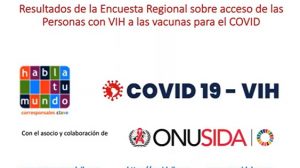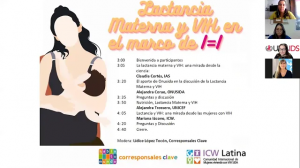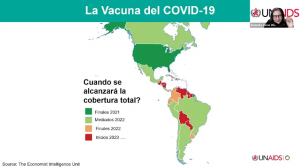 As some have predicted, once again there will be only a small number of participants from Latin America and the Caribbean. Moreover, in this case the organisers have focused on increasing numbers from Eastern Europe and Central Asia. According to the conference schedule, issues to be discussed include human rights, non-criminalisation of vulnerable populations, and especially, harm reduction for drug users. In a few days time we’ll know whether the organisers were able to meet their objectives with regards to community participation and debate around these key issues.
As some have predicted, once again there will be only a small number of participants from Latin America and the Caribbean. Moreover, in this case the organisers have focused on increasing numbers from Eastern Europe and Central Asia. According to the conference schedule, issues to be discussed include human rights, non-criminalisation of vulnerable populations, and especially, harm reduction for drug users. In a few days time we’ll know whether the organisers were able to meet their objectives with regards to community participation and debate around these key issues.
Besides the small numbers of scholarships granted to participants from Latin America and the Caribbean, there will also be very few sessions with simultaneous Spanish interpretation; another significant barrier for our region in the promotion of lesson learning and knowledge sharing.
Since Vancouver in 1997, International AIDS Conferences are no longer simply scientific and academic gatherings; they are now important political events with the ability to yield considerable impact. We believe that human rights, the central issue of this Conference, may well be taken over by the urgent issue of resource constraints. Not far from where the official opening will take place, a demonstration is to be held calling upon developed countries and donors to meet their commitment to support the fight against AIDS with additional, sustainable and foreseeable resources. These commitments may soon be in decline, as we have reported in previous articles concerning the lack of financing for the Global Fund to fight AIDS, TB and Malaria.
Aside from this spate of economic crises in the “north” and the resulting budget cuts, there is also a change in the priorities held by the international agencies. If nothing else, this certainly reflects unsteadiness in donors’ political commitments; it’s not a question of resource availability, the money’s there, it’s just being spent elsewhere on other priorities and emergencies.
Moving beyond demands and complaints, now is the time to acknowledge that for many key actors in the response to the epidemic, AIDS exceptionality is no more. And although common sense and statistics show that they are not right, this shift is now inevitable. What should we do? Nobody knows. But generating strategic discussion around this issue must no longer be avoided. Is Vienna the place? It is difficult to say. The more likely scenario is a large number of colleagues walking up and down the venue’s interminable corridors doing the same old thing as always. But this much is for sure: these almost circus-like events will be one of the first things to become unsustainable due to the lack of funds, supported rightly by the question of the relative added value of such conferences to the overall response to the epidemic.
A team of three key correspondents is providing live coverage of the conference in Spanish and will keep you informed about the many things to come and the issues being discussed in Vienna. Check out our new website where we will be publishing the articles. We will strive to contribute with strategic information for our communities, by providing a critical perspective on priority issues. And we won’t lose hope that this big event will live to be an opportunity to share experience and knowledge, engage in social and political debate, and act as an important mechanism of accountability.










Añadir comentario